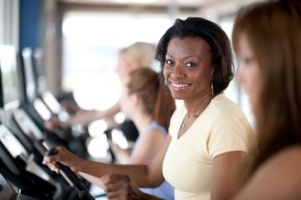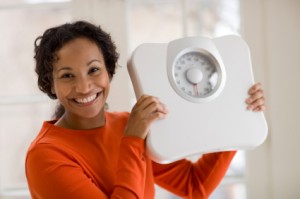Growing up as a little girl, I can remember my mom spending a lot of time straightening my hair. She would go through the process of washing and pressing it, then she would section it out into some nice, pretty ponytails and I would head outside to play. On my way out the door she would yell, “Don’t sweat your hair out!,” a phrase most black women heard growing up.
What my mom meant was I shouldn’t go outside and get all sweaty, because that would reverse all the work she had just done. Any moisture on my hair would result in it becoming puffy and curly again. Many women grow up with the mentality of avoiding any type of sweat for fear of messing up their hair. Some even go as far as avoiding exercise in the name of beauty.
Black women have the type of hair that requires a lot of maintenance, and if time and money are spent in the beauty salon getting it styled and straightened, most aren’t likely to hit the gym and allow sweat to ruin it. Unfortunately, when this happens, health suffers. Some may think avoiding workouts to keep their hair intact isn’t a big deal, but the issue is serious.
In fact, Surgeon General Dr. Regina Benjamin made an appearance at the recent Bonner Brothers International Hair Show in Atlanta, an annual show that features around 60,000 hair stylists. Dr. Benjamin, who is an African-American woman, wants to make sure black women know that a hairstyle shouldn’t keep you out of the gym.
“I’ve talked to a number of women and that’s the first thing they tell you,” Dr. Benjamin said. “I know that was an issue for me. I didn’t want to mess up my hair. You sweat a lot in your hair and it changes your hairstyle completely,” she said.
And the problem isn’t limited to just black women. Dr. Benjamin mentioned how she has heard other ethnic groups mention the same thing.
“I’ve heard it from Hispanics. I’ve heard it from a couple of my older white patients that I have at home. They’re saying I get my hair done every weekend – I don’t want to be exercising after I get my hair done.”
According to the American Journal of Public Health, fewer than 30 percent of minority women in the United States get the recommended level of exercise. The number one reason cited was lack of time, with “economic constraints, major life changes or traumas, safety issues, weather or environment or the hassle of personal care such as showering and keeping hair looking good.”
African-American women have the highest rate of obesity compared to other groups in the United States. Four in five black women are overweight or obese. Being overweight or obese increases your risk for heart disease, high blood pressure, type 2 diabetes, stroke, sleep apnea and some cancers.
Exercise is known to lower BMI and, in turn, lower your risk of disease. It is recommended that women complete either two-and-a-half hours of moderate intensity aerobic activity each week , or one hour and 15 minutes of vigorous intensity aerobic activity each week. Combing the recommended amount of exercise with a healthy diet is a sure fire way for black women to improve our health statistics.
While dreading the hassle is understandable, a lot of African-American women don’t let their hair stand in the way of their health. Respected fitness blogger Josie Maurer has always been active and shares her philosophy of finding a balance between fitness and your greedy side through her blog Yum Yucky. When asked if she had ever neglected workouts because of her hair, she stated emphatically, “I’ve tried to do all I could to maintain a nice fresh do in the face of some serious workouts, but it never worked. My best ideas were to save my hardest workouts for the weekend when I didn’t necessarily have to be as presentable for work during the week.”
Fitness guru and creator of Optimum Body Sculpting Carol Dunlop also never lets her hair get in the way of her workouts. “Personally, I have never been one to worry about my hair going back to its natural state. I put my health first and foremost and decided to deal with the issue head on. I feel that each of us needs to really look at why we are allowing our hair or hair style to dictate what we can and cannot do.”
Along with the cardiovascular exercise recommendations, you also need to include muscle strengthening activities on two or more days of the week. While this may sound intimidating for women not used to exercise, there are a lot of simple, easy exercises you can do at home that only require your body weight. You can also try a sweat-free workout.
For those still a little unwilling to trade their hair for health, here are some things you can do with your hair that will lessen the damage. Carla Triplett from The Biggest Loser season 7 spoke candidly about how she prepared for her strenuous workout time on the ranch.
“When I got cast for the Biggest Loser, the first thing I did was pay a visit to my hair dresser. She made me some custom made wigs. So my custom-made personalized, removable wig keeps me looking good, minimizes the time I have to spend in a hair salon, and it allows me to work out the way I want and need to.”
Wigs are one option, but expensive. If you aren’t willing to spend the cash, you can try wearing braids, a weave or simply wearing the hair naturally curly so that there is no need to worry about sweat compromising a straight style.
The connection between black women and obesity is very real. Avoiding exercise for the sake of hair can truly be hazardous to anyone’s overall health. It is important to weigh your options and find a way to fit in exercise to maintain a healthy lifestyle. There are solutions to keeping your hair presentable after exercising; it just might take some creativity. Choose a hair option that works for you and commit to getting in some exercise most days of the week. Put your health first and the benefits of living longer and avoiding weight related diseases will definitely be more rewarding than any hairstyle could ever be.
Via CNN Health and WomensHealth.gov

Hi Ma’am,
I agree 100% with this. I know several black women who struggle with this same thing, and there was even a point in my life where I let this way of thinking hold me back from exercising. I’m currently 27 years old and I have been getting relaxers since the age of 5 up until about 4 months ago. I’m hoping I can keep this going! Anyway, anytime I had a fresh relaxer, I made sure not to do anything that would cause my scalp to sweat–ruining the effects of the relaxer. However, throughout my 7 1/2 years of serving in the military I have learned that no matter what, I will just have to sweat it out sometimes, period. I have also heard that you shouldn’t use Mane & Tail shampoo after getting a relaxer, because it will strip the effects and you will see new growth faster than usual. I’m to a point now, that I’m thinking wait–isn’t new growth what we want to see? We want our hair to grow, yet we won’t utilize the natural inside-to-outside moisturizing benefits that sweating provides. When we use relaxers, and then go day after day without sweating, we constantly have to add moisturizers to our hair and scalp in order to keep it from getting dry, causing dandruff, and breaking off. In addition to weakening the condition of our hair, we are also decreasing our levels of health. These are two negative things that haven’t been talked about enough amongst black women. We are hurting ourselves in order to ensure that we maintain a certain look, and we are essentially putting limitations on the various levels of beauty that we can achieve even with our hair in it’s natural state–not to mention, it grows better naturally. I’m not suggesting that every black woman has to go “natural” in order to be healthy but hair definitely should not come ahead of health. Whether our hair is natural or relaxed, we have to find the time to dedicate to maintaining our physical health, as it is much more important. Unfortunately for people with relaxed hair, that may mean more washing, drying, and flat ironing to keep the hair straightened. Either way, you have to make a sacrifice somewhere, and sacrificing my health is not an option for me. I enjoyed reading your article and I believe more people need to see it, so I will be sharing it on Facebook Ma’am!
Thanks,
1LT Brittley Caldwell